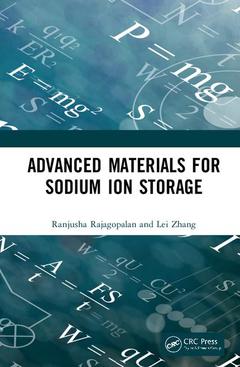Advanced Materials for Sodium Ion Storage
Auteurs : Rajagopalan Ranjusha, Zhang Lei

Globally, lithium ion batteries (LIBs) are leaders in the energy storage sector but there are concerns regarding load leveling of renewable energy sources as well as smart grids and limited availability of lithium resources resulting in cost increase. Therefore, sodium ion batteries (SIBs) are being researched as next-generation alternatives to LIBs due to their similar sustainability and electrochemistry. This book mainly focuses on the current research on electrode materials and proposes future directions for SIBs to meet the current challenges associated with the full cell aspect. Further, it provide insights into scientific and practical issues in the development of SIBs.
1. INTRODUCTION FOR SODIUM ION BATTERIES. 2. ELECTROCHEMICAL REACTION MECHANISM IN SODIUM ION BATTERIES. 3. ANODE MATERIALS FOR SODIUM ION BATTERIES. 4. CATHODE MATERIALS FOR SODIUM ION BATTERIES. 5. ELECTROLYTES, ADDITIVES AND BINDERS FOR SODIUM ION BATTERIES. 6. CURRENT CHALLENGES AND FUTURE PERSPECTIVES.
Dr. Ranjusha Rajagopalan received her PhD in Physics with specialization in battery technology from University of Wollongong, Australia in the year 2017. She is currently working on functionalized organic/inorganic materials for developing high performance metal ion batteries, including sodium and potassium ion batteries at College of Chemistry and Chemical Engineering, Central South University, China. She received her Master and Bachelor Degree in Physics from Calicut University, India.
Her research interests include enhancement of power and cycling performances of battery electrodes by designing novel materials and composites. As part of her collaborative research and exchange programs, she has worked in many foreign universities like Nanyang Technological University, Singapore; Sichuan University, China; and Pai Chai University, S. Korea. She is a recipient of several prestigious fellowships, which includes, postdoctoral international exchange program funding, China 2019-2021; Faculty Scholarship (Research and Innovation division) UOW, Australia, 2014; CSIR (Council of Scientific and Industrial Research) Scholarship, India, 2012; MNRE (Ministry of New and Renewable Energy) Scholarship, India, 2011-2012; DST (Department of Science and Technology) Scholarship, India, 2010-2011. RRC (Resources Regional Center) Scholarship, South Korea, 2011. She has published over 34 journal research articles, 2 book chapters and 1 book and has filed 5 Indian patents in the areas of energy storage and generations.
Dr. Lei Zhang received his PhD in Physics with specialization in energy storage systems from University of Wollongong, Australia in the year 2017. He is currently working on symmetric electrodes for developing novel energy storage system at Centre for Clean Environment and Energy, Griffith University, Australia. He received his Master Degree in Qingdao University Science and Technology, China.
His research ma
Date de parution : 06-2019
15.6x23.4 cm
Thèmes d’Advanced Materials for Sodium Ion Storage :
Mots-clés :
Electrochemical Performances; Electrochemical reaction mechanism; Anatase TiO; Intercalation; Energy Density; Anode Materials; American Chemical Society; Cathode Materials; Transition Metal; Electrolytes; Cycling Stability; electrode materials; Improved Electrochemical Performances; sodium ion batteries; SIBs; smart grids; Coulombic Efficiency; High Theoretical Capacity; Specific Discharge Capacity; Reversible Capacity; High Reversible Capacity; XPS Test; Na Ions; Cathode Material; Homo Energy Level; Metal Organic Materials; Transition Metal Oxides; Large Volume Expansion; Redox Couple; High Specific Capacity; Good Cycling Stability; Transition Metal Chalcogenides



